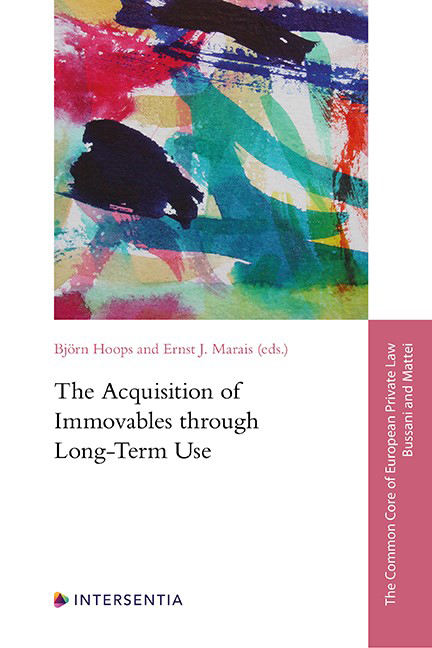Book contents
- Frontmatter
- General Editors’ Preface
- Preface
- Contents
- List of Cases
- Table of Legislation
- List of Abbreviations
- List of Contributors
- Case PART I INTRODUCTORY MATTERS
- PART II CASE STUDIES
- PART III GENERAL CONCLUSIONS
- Appendix I Instructions for the Project on the Acquisition of Immovables through Long-Term Use
- Index
Comparative Analysis – Case 4
Published online by Cambridge University Press: 26 May 2022
- Frontmatter
- General Editors’ Preface
- Preface
- Contents
- List of Cases
- Table of Legislation
- List of Abbreviations
- List of Contributors
- Case PART I INTRODUCTORY MATTERS
- PART II CASE STUDIES
- PART III GENERAL CONCLUSIONS
- Appendix I Instructions for the Project on the Acquisition of Immovables through Long-Term Use
- Index
Summary
GENERAL INTRODUCTORY REMARKS ON CASE 4
Case 4 considers long-term use of land where control over the land was obtained through blackmail. The variations concern whether the blackmailer (Carla) can acquire the land (which belongs to André) through long-term use (Variation 4.1.), and whether the blackmail has any relevance if Carla transferred the land to a third party (Bob) who has no knowledge of the blackmail (Variation 4.2.). These two matters are addressed under the headings which follow.
COMPARATIVE REMARKS ON VARIATION 4.1.
ACQUISITIONS OF LAND IF USE ORIGINATED IN BLACKMAIL
Variation 4.1. raises the question whether blackmailing would render the transfer of land void(able) and, if so, whether an acquisition through long-term use could heal this defective transfer. The reports show that jurisdictions follow two solutions to these questions.
ACQUISITION OF LAND DESPITE BLACKMAIL
In terms of the first solution, Carla acquired the land through the transfer despite the blackmail and the concomitant voidability of the contract. Most legal systems set a time-limit within which such contracts must be avoided. If André does not avoid the contract during this period, Carla retains the land.
Countries which follow the first solution may be divided into two sub-groups as regards how they address the present issue. In the first sub-group, which comprises Spain, Catalonia, Germany, Louisiana, Italy, Poland, Russia, Belgium, the Netherlands, Ireland, and Scotland, acquisition through long-term use could technically result in Carla acquiring the land, though only if she complied with the minimum period of long-term use. In all these countries (except Scotland, where a ten-year period for acquiring land through long-term use applies, which is shorter than the limitation period for setting aside the transfer) the period for acquiring land through long-term use is (sometimes significantly) longer than the period within which the contract must be avoided. As a result, long-term use does not play a role in these legal systems, as André will already be barred from bringing an action to avoid the contract before Carla would have acquired the land through long-term use.
- Type
- Chapter
- Information
- The Acquisition of Immovables through Long-Term Use , pp. 647 - 650Publisher: IntersentiaPrint publication year: 2022



